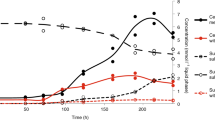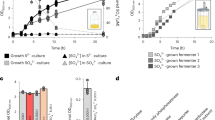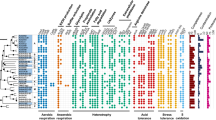Abstract
Until recently all archaebacteria isolated conformed to one of three basic phenotypes: they were either methanogens, extreme halophiles, or ('sulphur-dependent') extreme thermophiles1. However, a novel phenotype, that fits none of these categories, has recently been described2. The organism, strain VC-16 (tentatively called "Archaeoglobus fulgidus") reduces sulphate—the only archaebacterium so far known to do so—and makes very small quantities of methane, although it lacks some of the cofactors normally associated with methanogenesis2. These characteristics suggest that strain VC-16 might represent a transition form between an anaerobic thermophilic sulphur-based type of metabolism (which seems to be the ancestral metabolism for archaebacteria3,4) and methanogenesis (which somehow then derives from it). We here show that the lineage represented by strain VC-16 arises from the archaebacterial tree precisely where such an interpretation would predict that it would, between the Methanococcus lineage (which is the deepest of the methanogen branchings) and that of Thermococcus (the deepest of all branchings on the methanogen side of the tree).
This is a preview of subscription content, access via your institution
Access options
Subscribe to this journal
Receive 51 print issues and online access
$199.00 per year
only $3.90 per issue
Buy this article
- Purchase on Springer Link
- Instant access to full article PDF
Prices may be subject to local taxes which are calculated during checkout
Similar content being viewed by others
References
1. Jones, W. J., Nagle, D. P., Jr & Whitman, W. B. Microbiol Rev. 51, 135–177 (1987). 2. Stetter, K. O., Lauerer, G., Thomm, M. & Neuner, A. Science 236, 822–823 (1987). 3. Woese, C. R. & Olsen, G. J. Syst. appl. Microbiol. 7, 161–177 (1986). 4. Woese, C. R. Microbiol. Rev. 51, 221–271 (1987). 5. Woese, C. R., Stackebrandt, E. & Ludwig, W. Molec. EvoL 21, 305–316 (1985). 6. Woese, C. R., Gutell, R., Gupta, R. & Noller, H. F. Microbiol. Rev. 47, 621–669 (1983). 7. Jarsch, M. & Bocke, A. Syst. appl. Microbiol. 6, 54–59 (1985). 8. Lechner, K., Wich, G. & Bock, A. Syst. appl Microbiol. 6, 157–163 (1985). 9. Yang, D., Kaine, B. P. & Woese, C. R. Syst. appl. Microbiol. 6, 251–256 (1985). 10. Gupta, R., Lanter, J. & Woese, C. R. Science 221, 56–659 (1983). 11. Olsen, G. J. et al J. molec. EvoL 22, 301–307 (1985). 12. Leinfelder, W., Jarsch, M. & Bock, A. Syst. appl. Microbiol. 6, 164–170 (1985). 13. Jukes, T. H. & Cantor, C. R. in Mammalian Protein Metabolism (ed. Munro, H. N.) 21–132 (Academic, New York, 1969). 14. Achenbach–Richter, L., Gupta, R., Stetter, K. O. & Woese, C. R. Syst. appl Microbiol 9, 34–39 (1987). 15. Leder, P., Tiemeier, D. & Enquist, L. Science 1%, 175–177 (1977). 16. Messing, J. Meth. Enzym. 101, 20–78 (1983). 17. Biggin, M. D., Gibson, T. J. & Hong, G. F. Proc. natn. Acad. Sci. U.S.A. 80,3963–3965 (1983). 18. Yang, D. C., Kaine, B. & Woese, C. R. Syst. appl. Microbiol. 6, 251–256 (1985). 19. De Soete, G. Psychometrika 48, 621–626 (1983).
Author information
Authors and Affiliations
Rights and permissions
About this article
Cite this article
Achenbach-Richter, L., Stetter, K. & Woese, C. A possible biochemical missing link among archaebacteria. Nature 327, 348–349 (1987). https://doi.org/10.1038/327348a0
Received:
Accepted:
Issue Date:
DOI: https://doi.org/10.1038/327348a0
This article is cited by
-
Mixing of meteoric and geothermal fluids supports hyperdiverse chemosynthetic hydrothermal communities
Nature Communications (2019)
-
Thermodesulfobacterium geofontis sp. nov., a hyperthermophilic, sulfate-reducing bacterium isolated from Obsidian Pool, Yellowstone National Park
Extremophiles (2013)
-
Carbon monoxide-dependent energy metabolism in anaerobic bacteria and archaea
Archives of Microbiology (2008)
-
Enzymes and coenzymes of the carbon monoxide dehydrogenase pathway for autotrophic CO2 fixation in Archaeoglobus lithotrophicus and the lack of carbon monoxide dehydrogenase in the heterotrophic A. profundus
Archives of Microbiology (1995)
-
Pyruvate: ferredoxin oxidoreductase from the sulfate-reducing Archaeoglobus fulgidus: molecular composition, catalytic properties, and sequence alignments
Archives of Microbiology (1995)
Comments
By submitting a comment you agree to abide by our Terms and Community Guidelines. If you find something abusive or that does not comply with our terms or guidelines please flag it as inappropriate.



